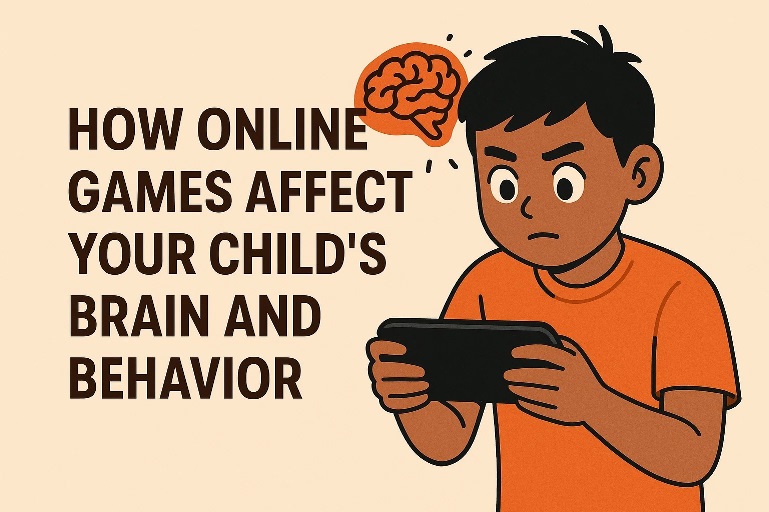Online games have become a big part of children’s lives today. From smartphones and tablets to gaming consoles and computers, children have easy access to games of all types. While gaming can be entertaining and even educational in some cases, excessive and unregulated play can have a noticeable impact on a child’s brain and behavior.
As a parent, understanding how online games affect children can help you make informed decisions about their screen time and overall lifestyle.
The appeal of online games
Online games are designed to keep players engaged for long periods. Bright colours, exciting sound effects, rewards, and levels make children feel motivated to keep playing. Multiplayer games also add a social element, where children can chat and play with friends or strangers from around the world. This combination of entertainment, challenge, and social connection can be hard for young minds to resist.
Impact on the brain
Reward system activation
Many online games trigger the brain’s reward system by releasing dopamine, the feel-good chemical. Every time a child completes a level, wins a battle, or earns a reward, dopamine is released, making them feel happy and satisfied. Over time, this can create a cycle where children crave the instant rewards of gaming more than other activities.Reduced attention span
Fast-paced games with constant action can make it harder for children to focus on slower, less stimulating activities like reading or homework. A 2022 study by the American Academy of Pediatrics found that children who spent more than three hours a day gaming showed signs of reduced attention span compared to those who played less frequently.Decision-making and problem-solving
Not all effects are negative. Strategy-based games can improve quick thinking, problem-solving skills, and hand-eye coordination. However, the benefits depend on the type of game and the amount of time spent playing.Sleep disruption
Late-night gaming can interfere with sleep patterns. Blue light from screens reduces melatonin production, making it harder for children to fall asleep. Poor sleep affects mood, memory, and academic performance.
Impact on behaviour
Increased aggression
Some studies, including one from the Journal of Youth and Adolescence, suggest that prolonged exposure to violent games can increase aggressive thoughts and behavior in children. This does not mean every child will become aggressive, but it can influence how they react to frustration or conflict.Social withdrawal
Children who spend excessive time gaming may start avoiding outdoor play, family time, or real-life friendships. Over time, this can lead to social isolation and difficulty interacting face-to-face.Reduced physical activity
Gaming for long hours often replaces physical activities. This sedentary lifestyle can contribute to weight gain, poor posture, and reduced fitness levels.Academic impact
Excessive gaming can eat into homework or study time, leading to lower grades. Some children may rush through assignments or skip them entirely to get back to their games.
Finding a healthy balance
The goal is not to ban online games completely but to create a balanced routine. Parents can set daily time limits, encourage breaks, and choose age-appropriate games. Involving children in outdoor sports, reading, and hobbies can help them develop interests beyond gaming.
According to the World Health Organization, children aged 5–17 should get at least 60 minutes of physical activity every day. Combining this with limited screen time can protect both their mental and physical health.
My thoughts
Online games are here to stay, and they can be both fun and educational when used in moderation. However, unregulated gaming can affect your child’s brain development, behavior, and overall well-being. As parents, guiding children to balance gaming with study, physical activity, and family interaction is the key to ensuring healthy growth in the digital age.
By Nidhi Mehta – Founder – IndiaTutor.in
🔥 Post Engagement
👁️ 12 Total Views
🔥 1 Views Today
📈 12 Views Last 7 Days
Share:
WhatsApp | Facebook | Twitter | LinkedIn
To share your Feedback or Review – Contact Us
Are you a Tutor? Register your Tutor profile on India Tutor to connect with Students in India and Abroad.
Are you a Parent or Student? – Submit Tutor Wanted Form to reach relevant tutors registered on IndiaTutor.in.
Do you own a Tuition Center? Want to connect with students in your local area? List your center with us.
Free Online Self Evaluation Tests for Tutors and Students
Read our Reviews Have Questions? Read FAQs

